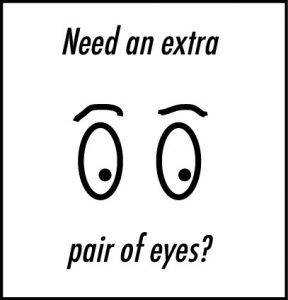
Hi, I’m Cynthia Williams, copy editor and independent contractor with Style Sheets Editorial Services. I help all kinds of experts—academics, consultants, book authors, nonprofit communicators, and advocates—refine their prose so that they speak clearly to their audience. Everyone (including blog-writing copy editors) needs an editor.
Below are a few of the ways copy editors’ work goes beyond helping with punctuation or correct grammar.
- Consistency: Did you say 34% of all grantees in the executive summary and 4% in section 2? Does your introduction mention coverage of program participant suggestions for improvement, but your Recommendations section writer forgot to include that? Are your subheads and sub-subheads uniform? Copy editors can make sure information in reports and proposals is consistent in content and formatting.
- Accessibility: Your editor can help you sense when a report begins to resemble alphabet soup (too many acronyms) or when turns of phrase may be too foreign and jargony. A sentence can be grammatically correct and still not be the best way to present information to your audience. Help in this area can come in handy with grant-proposal writing, when the audience may not be familiar with your organization and you need to describe your mission, methods, and plan as simply as possible.
- Cohesion: “Voice” isn’t a term just for fiction writers. When a three-person team drafts a report, and then gets feedback from the team lead, separately written sections can seem disjointed. A copy editor can help smooth these out and help your report or proposal reflect the tone of the organization.
- Style manual adherence: Researchers can’t be expected to keep up with the latest changes to The Chicago Manual of Style or the Publication Manual of the American Psychological Association. That’s why editors pore over these tomes and keep track of rules on capitalization, citation and reference formats, and other topics exciting only to us.
Too, your organization may have a house style, and your editor can ensure that your document is formatted like your organization’s other reports and that it follows special phrasing, capitalization, spellings, etc.
If your organization doesn’t have a style guide but would like to create guidelines for its writers and researchers, an editor can help you create one!
Hot Tip:
In a sentence packed with too many elements (e.g., a “which” clause, parentheses and/or dashes, and multiple phrases beginning with “of,” “from,” or “to”), your excellent point may get lost in the clutter.
The solution might be to break up that sentence into two or three separate sentences.
Rad Resources:
- 5 Tips for Clear Writing from Style Sheets Editorial
- Plain Language Checklist from the federal government (copy editors can help with implementation)
- Directory of the Editorial Freelancers Association (a searchable listing of editors with various specialties)
Do you have questions, concerns, kudos, or content to extend this aea365 contribution? Please add them in the comments section for this post on the aea365 webpage so that we may enrich our community of practice. Would you like to submit an aea365 Tip? Please send a note of interest to aea365@eval.org. aea365 is sponsored by the American Evaluation Association and provides a Tip-a-Day by and for evaluators.


Thanks, Sandra and Jenna!
This is a brilliant blog post, Cynthia. You can not imagine how perfectly timed it was, too. Abundant thanks.
This might be my favorite AEA365 blog post ever! I couldn’t agree more with the value of a copyeditor for important reports and publications.
Oh yeah, I am 100% behind you Cynthia!
As evaluators I think we can all learn to write more cleanly (Or is it cleaner? Ack! I need a copyeditor!)
Kylie
Yes, Kylie. I’m always checking my writing for ambiguity. I understand what I’m saying perfectly fine, but I give my draft to someone else, and some of my points are buried in the (unclean) muck!
That’s why we revise (and have editors), ha!